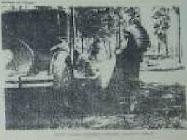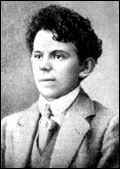Why was Mandelstam so important to me?
It happened in two stages. First, I read the poems in the David McDuff translation (published in the early 70s), and was particularly interested in the imagery - its fusion of obscurity/concision/radiance. Then, I read Nadezhda Mandelstam's memoir, "Hope Against Hope". . . and fell in love with both of them - both the poet-protagonist and the narrator-memoirist.
Aside from its greatness - the often-acknowledged spectacular, fascinating and moving quality of "Hope Against Hope" - for there are a number of great books around - why did it mean so much to me?
Poetry, as I started to say in a post from yesterday, is not, for me, simply a "thing in itself" : it's contaminated with, inseparable from, spiritual, intellectual, psychological realities. In the late 70s, Mandelstam served as a kind of imaginary friend or antithetical self, helping me integrate a deeply conflicted & confused (almost as confused as now!) sense of the world. He was a mediator or catalyst. I'm reminded of another book I read in the early 80s which served a similar role in a much more minor way, a study by Harold Fisch titled "Jerusalem and Albion : the Hebraic factor in 17th century English literature". The study focuses on the specific rhetorical functions of poetry in contrast to those of discourse or philosophy, and relates them to the debates over "Hebraism & Hellenism" from the Renaissance through Matthew Arnold.
Why did I need these intellectual "mediators" on different levels? Because I was involved in a decades-long search for resolution of an inner conflict which originated in about 1973, when I underwent a psychological/spiritual crisis at college. For those old enough to remember, this was the time of, among other phenomena, the "Jesus freaks". I suppose you could count me (as a quiet, introverted example) among their number. I was a "product" both of American Protestantism, and of an early enthusiasm for writing and poetry - and I had tremendous difficulty synthesizing the two, after undergoing an excruciating vocational crisis which included a manic breakdown & a renunciation of writing which lasted several years.
My writing experience seems to break into antithetical plateaus. In the late 60s I was enthralled with Ashbery & the NY School, and wrote quite a lot of imitative work in that vein. By the late 70s, after a hiatus from writing (& a long period of wandering, music-playing, community organizing, etc.) I was trying to rediscover my talent for it . Mandelstam & Russian poetry provided a kind of distant model universe, a heroic, lyrical, & integrative world-view - probably extremely simplistic, yet it gave me inspiration and confidence, and gave me a kind of perspective with which to re-approach the American traditions in my own way (it was only after reading Mandelstam that I was able to begin exploring Crane, Pound, Eliot, Olson, and other exemplary American poets).
1.07.2003
Labels:
Henry bio4,
Mandelstam2
Subscribe to:
Post Comments (Atom)



No comments:
Post a Comment